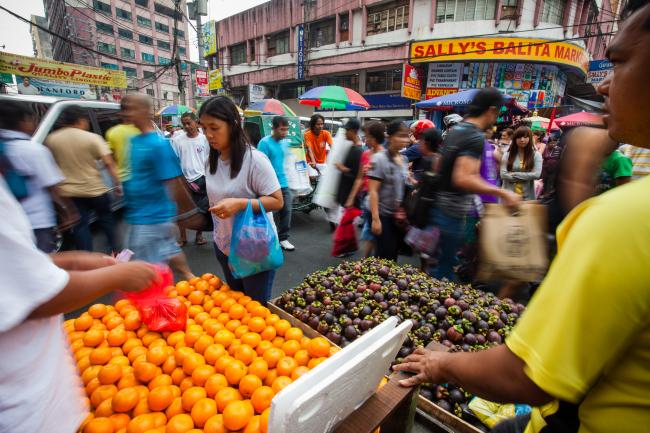(Bloomberg) -- The Philippine economy grew at the slowest pace in four years in the first quarter, increasing the likelihood the central bank will cut interest rates on Thursday. The peso and stocks fell.
Gross domestic product rose 5.6% in the first quarter from a year earlier, lower than all but one forecast in a Bloomberg survey of 23 economists. Growth slowed from 6.3% in the previous quarter, as delays in passing the budget this year stalled government spending.
Key Insights
- A standoff in Congress led to delays in approving the government’s budget, with state spending on new projects halted until it was resolved in April
- Economic Planning Secretary Ernesto Pernia said on Thursday the economy needs to expand an average of 6.1% in the next three quarters in order for the government to meet its growth target of 6% to 7%. That’s still “achievable” he said, if the government speeds up the rollout of new projects. The economy would’ve expanded as much as 6.6% if the budget wasn’t delayed, he said
- The growth slowdown gives the central bank more reason to cut interest rates on Thursday after 175 basis points of hikes in 2018. Thirteen of the 23 economists surveyed by Bloomberg predict a 25 basis-point cut
- Household consumption, which comprises more than 65% of GDP, may get a boost from the sharp slowdown in inflation from a nine-year high in 2018
Economists Views
- “Growth should rebound as government spending jumps back,” said Alex Holmes, an economist at Capital Economics Ltd. in Singapore. “However, we don’t think a sustained rebound is likely. While Bangko Sentral ng Pilipinas looks set to cut interest rates this afternoon, the lagged effects of sharp rate hikes last year are still feeding through to the economy.”
- The growth slowdown “may further increase the possibility of monetary easing this afternoon, by way of a cut in key policy rates and/or a cut in large banks’ reserve requirement ratio,” said Michael Ricafort, an economist at Rizal Commercial Banking Corp. in Manila
- “A lot will now rest on the BSP’s reaction to this,” said Eddie Cheung, emerging-market strategist at Credit Agricole (PA:CAGR) in Hong Kong. “The weak numbers further skews them towards cutting rates. We do expect better growth numbers ahead though, so its not grim.”
Get More
- The peso fell 0.3% to 52.26 per U.S. dollar as of 11 a.m. in Manila. The benchmark stock index dropped 1.7%
- Economic managers are pinning their hopes on the mid-term election in May -- and the heavy campaign spending that comes with it -- to power growth
- Click here to see a breakdown of GDP data
(Updates with comments from economists.)
